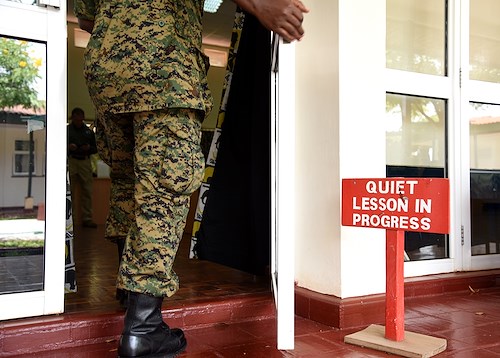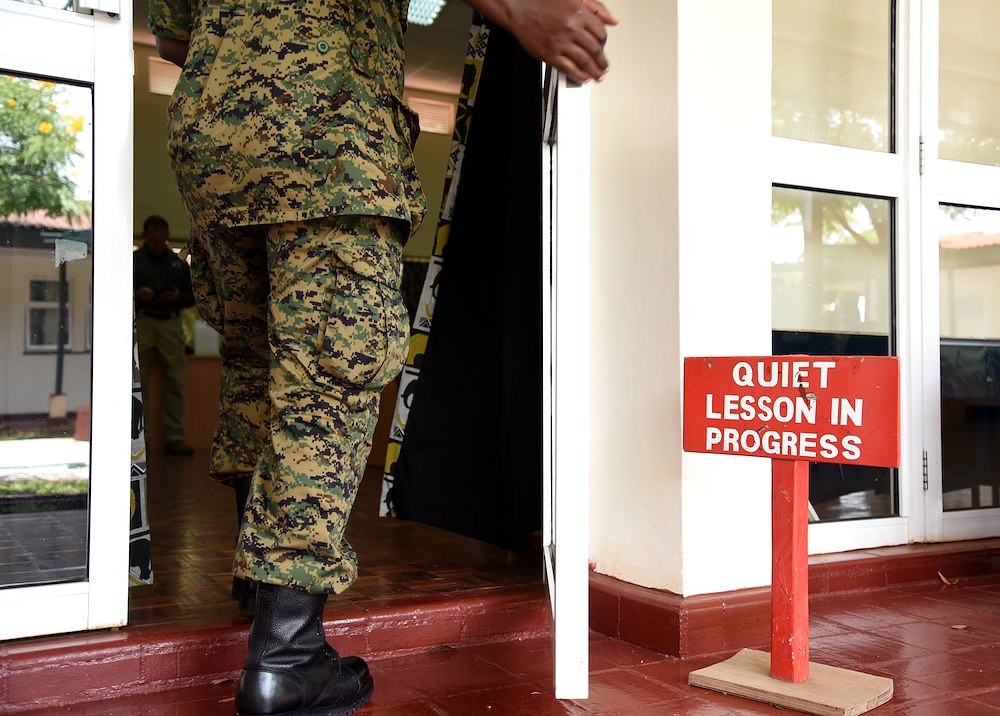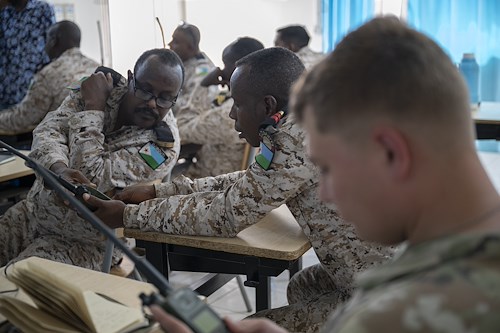Gallery contains 4 images
×
Photo 1 of 4
Combined Joint Task Force - Horn of Africa Image
A Ugandan military officer enters a classroom Feb. 29, 2016, during an African Union Mission in Somalia staff officers course in Nairobi, Kenya. The U.S. State Department’s Africa Contingency Operations and Training Assistance program sponsors courses like this every quarter and has trained approximately 45,000 African soldiers since 2004. (U.S. Air Force photo by Staff Sgt. Kate Thornton)
Photo by: Staff Sgt. Kate Thornton
Photo 2 of 4
Combined Joint Task Force - Horn of Africa Image
Kenyan, Ugandan and Burundi military officers review information with their mentor Feb. 29, 2016, during an African Union Mission in Somalia staff officers course in Nairobi, Kenya. The course, administered by the U.S. State Department’s Africa Contingency Operations and Training Assistance program, prepared the officers to work at the AMISOM headquarters level. (U.S. Air Force photo by Staff Sgt. Kate Thornton)
Photo by: Staff Sgt. Kate Thornton
Photo 3 of 4
Combined Joint Task Force - Horn of Africa Image
U.S. Army Capt. Erik Buendia, 403rd Civil Affair Battalion, mentors Burundi and Kenyan military officers on civil military engagement Feb. 29, 2016, during an African Union Mission in Somalia staff officers course in Nairobi, Kenya. The course covered six main functions necessary for successful military operations: logistics and personnel, intelligence, public information, civil affairs, military operations, and command leadership. (U.S. Air Force photo by Staff Sgt. Kate Thornton)
Photo by: Staff Sgt. Kate Thornton
Photo 4 of 4
Combined Joint Task Force - Horn of Africa Image
A Ugandan military officer analyzes maps prior to an exercise Feb. 29, 2016, during an African Union Mission in Somalia staff officers course in Nairobi, Kenya. The course included traditional classroom instruction, hands-on application, practical exercises, exposure to high-level military decision-making, and ended with one final exercise. (U.S. Air Force photo by Staff Sgt. Kate Thornton)
Photo by: Staff Sgt. Kate Thornton
Nearly 30 military officers from African Union Mission in Somalia (AMISOM) troop contributing countries met in Nairobi, Kenya, for a staff officers course administered by the U.S. State Department’s Africa Contingency Operations and Training Assistance (ACOTA) program.
At the beginning of February, the officers representing the defense forces of Kenya, Burundi and Uganda began the five-week course as part of their training to serve at the AMISOM Force Headquarters or on the command level staff for any of the six AMISOM sectors in Somalia.
“(The course) is giving these soldiers the basic skills they need to conduct military operations in Somalia,” said Jon Dahms, U. S. Africa Command deputy chief for Public Affairs and course mentor. “Preparing these officers for success in this operation helps AMISOM with progress toward defeating Al-Shabaab and making Somalia a unified, (peaceful and stable) country again, so I think we’re laying the groundwork here for that success.”
Now in March, students have graduated with the skills to lead their troops and advise commanders toward strengthening multinational peacekeeping operations, neutralizing threats like Al-Shabaab and forming an overall more stable East African Region.
“When they do deploy to Somalia, they can just transition right into the force headquarters and not miss a beat,” said U.S. Army Capt. Erik Buendia, 403rd Civil Affairs Battalion and course mentor. “(This course) is a more efficient and proficient way of getting everyone on the same page.”
The course, led by instructors and mentors from ACOTA, AFRICOM and Combined Joint Task Force-Horn of Africa, separated students into their six main directorates necessary for successful military operations: logistics and personnel, intelligence, public information, civil affairs, military operations, and command leadership.
Even though the course consisted of only 25 training days, it covered 30 different topics, requiring the utmost focus and discipline from students, instructors and mentors.
“We really tried to build a positive working environment,” Buenida said. “Allowing them enough time to rehearse, brief and ask questions.”
This is the second iteration of the five-week course after it was extended from four weeks to five, with the additional week in the beginning focusing on the officers’ specific specialties. After concentrating on their specific duties, students developed communication skills and learned more about common practices amongst the various countries’ officers and directorates.
“It ultimately allows them to have a standard operating procedure,” Buendia said. “They might do something one way in Kenya and one way in Uganda, but once they get to Somalia they need to be on the same page, and that’s what this course does.”
The subsequent weeks included traditional classroom instruction, hands-on application, practical exercises, exposure to high-level military decision-making, and ended with one final exercise.
“With every week that goes by, you can see how confident they get.” Buendia said. “They know what to do and they know what to ask for.”
Instructors, mentors and students agreed that the course was difficult, but allowed everyone to benefit by sharing each other’s experiences and knowledge.
“It’s a personal satisfaction that I’ve been able to help somebody that might go to Somalia and apply what I’ve taught them,” Buendia said.
The ACOTA program sponsors courses like this every quarter and has trained approximately 45,000 African soldiers since 2004. Working together with AFRICOM and CJTF-HOA, the program continues to train all levels of AMISOM troops toward the shared goal of a peaceful, stable region.

















